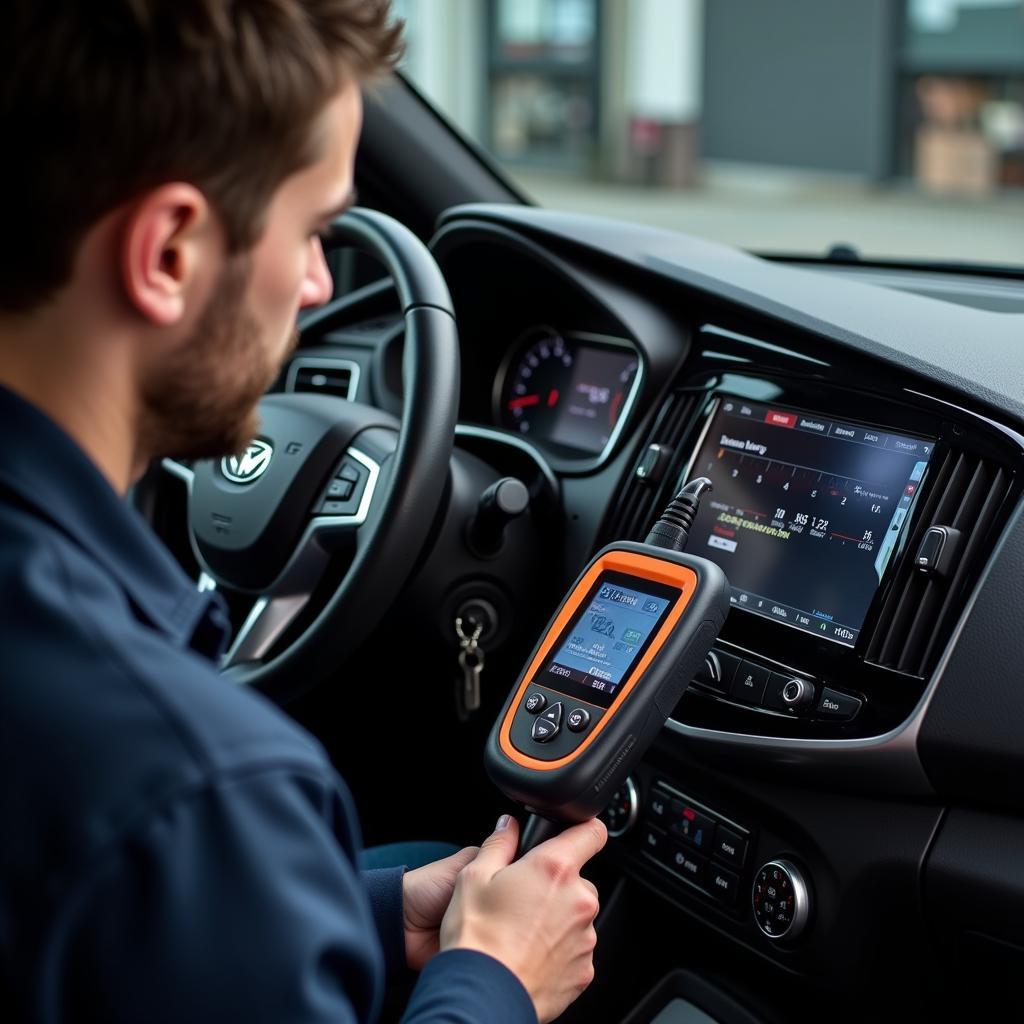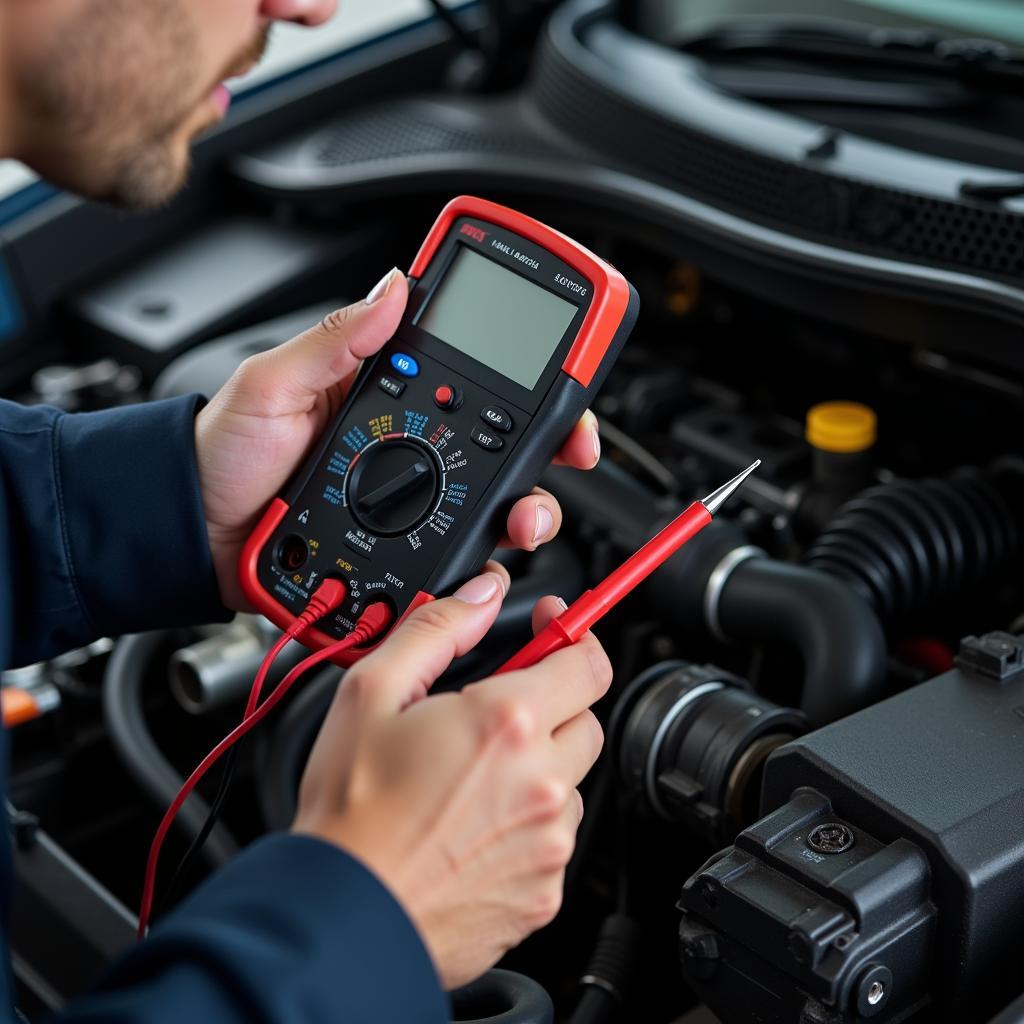Finding out what’s wrong with your car can be stressful. That check engine light flashing is never a good sign, and ignoring it can lead to bigger problems down the road. So, where can you get your car on diagnostics and understand what those cryptic codes mean? This comprehensive guide dives into everything you need to know about car diagnostics, from where to go to what to expect.
Understanding Car Diagnostics: More Than Just a Check Engine Light
 Car Diagnostic Tools
Car Diagnostic Tools
Car diagnostics involve using specialized software and hardware to communicate with your car’s computer system. This system, often referred to as the On-Board Diagnostics (OBD) system, constantly monitors various components and systems within your vehicle. When it detects an issue, it logs a Diagnostic Trouble Code (DTC) in its memory.
what is a diagnostic on a car goes beyond just reading these codes. A proper diagnosis involves:
- Retrieving DTCs: Identifying the specific codes stored in your car’s system.
- Analyzing Data: Interpreting the codes and analyzing live data from your car’s sensors.
- Troubleshooting: Pinpointing the root cause of the issue based on the gathered information.
Where Can I Get My Car On Diagnostics? Exploring Your Options
You have several options when it comes to getting your car diagnosed:
1. Auto Repair Shops: The Go-To Solution
Most auto repair shops, from small independent garages to large dealerships, offer car diagnostic services. These shops have experienced mechanics who can interpret the diagnostic codes and recommend the necessary repairs.
Pros:
- Expertise: Mechanics have the knowledge and experience to diagnose and fix a wide range of car problems.
- Comprehensive Service: Many shops offer a full range of repair services, making it convenient to get everything fixed in one place.
Cons:
- Cost: Labor rates at repair shops can vary significantly, and some may charge a separate fee for diagnostics.
- Transparency: Not all shops are transparent about their pricing and repair processes.
2. Mobile Mechanics: Diagnostics at Your Doorstep
Mobile mechanics bring the diagnostic service to you. They come equipped with the tools and software to perform on-site diagnostics and may offer basic repairs.
Pros:
- Convenience: No need to drive to a shop or wait in line.
- Potential Cost Savings: Some mobile mechanics may offer competitive pricing compared to traditional shops.
Cons:
- Limited Repairs: Mobile mechanics might not have the equipment or space for complex repairs.
- Reliability: Finding a trustworthy and qualified mobile mechanic can be challenging.
3. Auto Parts Stores: A Quick and Budget-Friendly Option
Many auto parts stores offer free or low-cost car diagnostic code reading as a service to customers.
Pros:
- Affordability: This option is often free or very affordable.
- Quick Check: It’s a quick way to get an initial idea of what might be wrong.
Cons:
- Limited Information: Code reading alone doesn’t provide a full diagnosis.
- Potential Upselling: Parts stores might use the opportunity to sell you parts, even if you don’t need them.
can obd ii car engine diagnostic code scanner
4. DIY Diagnostics: Taking Matters Into Your Own Hands
With the availability of affordable OBD-II scanners and mobile apps, you can perform basic car diagnostics yourself.
Pros:
- Cost-Effective: A one-time investment in an OBD-II scanner can save you money in the long run.
- Empowerment: Gain a better understanding of your car’s health.
Cons:
- Technical Knowledge: Requires some basic understanding of car mechanics and diagnostic codes.
- Misinterpretation: Misinterpreting codes can lead to unnecessary repairs or even damage.
how to use v310 car diagnostic tool
Choosing the Right Diagnostic Solution for Your Needs
 Mechanic Diagnosing Car Engine
Mechanic Diagnosing Car Engine
The best option for getting your car on diagnostics depends on your budget, technical skills, and the complexity of the problem.
- For basic code reading and minor issues, auto parts stores or DIY scanners can suffice.
- For complex problems or if you’re not comfortable with DIY, an auto repair shop or a trusted mobile mechanic is a better choice.
- If you’re unsure about the severity of the problem, start with a free or low-cost code reading at an auto parts store before deciding on the next steps.
“Understanding car problems early can save you time, money, and stress.” – John Smith, Senior Automotive Technician
Beyond Diagnostics: Ensuring Proper Repairs
Getting your car on diagnostics is just the first step. Once you have a diagnosis, it’s essential to:
- Get a Second Opinion: Don’t hesitate to get a second opinion from another mechanic, especially for major repairs.
- Understand the Repair Process: Ask the mechanic to explain the necessary repairs and why they are needed.
- Request a Written Estimate: Always get a written estimate that includes the cost of parts and labor.
By being proactive and informed, you can ensure that your car receives the right diagnosis and repairs, keeping it running smoothly for miles to come.

Leave a Reply